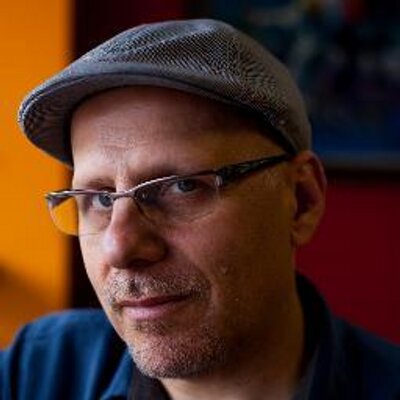For as long as he can remember Eric Weiner wanted to be a foreign correspondent. So he could hardly believe his good fortune when, one day in 1993, National Public Radio dispatched him to India, where he spent two years based in New Delhi, covering everything from an outbreak of bubonic plague to India’s economic reform.
Over the past decade, Weiner has reported from more than 30 countries, and served as a correspondent for NPR in New York, Miami and Washington. He is a former reporter for The New York Times, and was a Knight Journalism Fellow at Stanford University. He is author of The Geography of Bliss: One Grump’s Search for the Happiest Places in the World — recipient of the the 2008 Borders Original Voices Award. His commentary has appeared in the Los Angeles Times, Slate and The New Republic, among other publications. After traveling the world, Eric has settled, quasi-happily, in the Washington area, where he divides his time between his living room and his kitchen.
How did you get started traveling?
I was an early convert to life on the road. When I was five years old, I ran away from home. I got about a mile or two from my house before the Baltimore Country Police picked me up. I’ve been traveling ever since.
How did you get started writing?
I followed that old adage — write about what you know. My first job out of college was with Flying magazine (the world’s most widely read aviation magazine!) It was a great chance to hone my writing skills and see a bit of the world, too. Of course, there were other gigs down the road, but it was that spunky aviation magazine that launched my career.
What do you consider your first “break” as a writer?
In the late 1980s , I wrote a freelance article for The New York Times. I didn’t hear anything from the editor for weeks and assumed they had killed the piece. Then one day, walking down Second Avenue, I saw my article on the front page of the paper. I couldn’t believe my eyes then, and still don’t today.
As a traveler and fact/story gatherer, what is your biggest challenge on the road?
Knowing how much is enough. As a travel writer, everything is material. So, for me, the challenge is to know when I can safely say, “I have enough raw material. It’s time to write.”
What is your biggest challenge in the research and writing process?
Starting. Getting those first few words onto paper is always the hardest part, Once I get past that hurdle, everything flows. (Okay, “flow” is as overstatement, but you get the idea.)
What is your biggest challenge from a business standpoint?
Juggling my various projects. Setting priorities. Of course, money is also an issue. Any writer who tells you otherwise is a liar.
Have you ever done other work to make ends meet?
I’ve worked as a tennis instructor, amusement park ride operator (Ferris wheel), pizza maker, UPS truck loader (for ten days) and other odd jobs This was a while ago, though. I’m fortunate that now I earn my living through my writing.
What travel authors or books might you recommend and/or have influenced you?
Jan Morris. I learned from her the value of a strategically placed, carefully executed generalization. I also like the fact that she writes about cities, not nations. Cities have personalities. Then, of course, there is P.J O’Rourke’s masterful Holidays in Hell. It’s still a great read.
What advice and/or warnings would you give to someone who is considering going into travel writing?
Don’t listen to the naysayers! There’s a lot of negativity out there these days, with people predicting the demise of travel writing and even journalism. The field is definitely changing but I believe there will always be a need for people who write about places and write about them well.
What is the biggest reward of life as a travel writer?
One of the most satisfying moments is when a thought or an observation gels. Something just clicks into place and you know that “Yes! That’s it!” Nothing beats that feeling.

